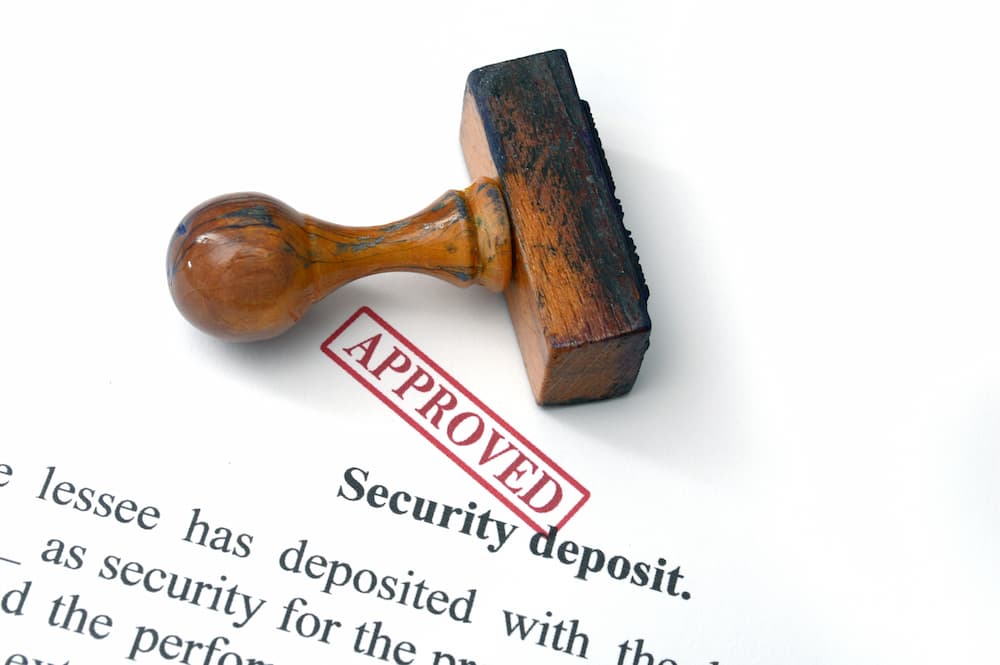
Choosing the perfect rental often comes with a variety of financial considerations, and the security deposit can be an important aspect of the decision-making process. This generally refundable payment holds a crucial role in safeguarding the interests of both the tenant and the landlord. But exactly what do you need to do to get your security deposit refund at the end of your lease?
We’ve put together an in-depth guide that aims to eliminate the guesswork involved, giving you practical tips and useful insights to ensure you’re well-prepared for the move-out inspection and stand a strong chance of getting your security deposit refunded in full.
What is a Security Deposit?
A security deposit is a sum of money held by the landlord or property management company to cover potential damages to the rental property, missed rent payments, or other lease violations. It is typically equivalent to one month’s rent, though this can vary depending on local laws and property types.
The primary purpose of this deposit is to incentivize tenants to maintain the property in good condition and uphold their end of the lease agreement.
Are Security Deposits Refundable?
Yes, security deposits are refundable, provided that the tenant fulfills the lease terms and leaves the property in satisfactory condition.
However, there are specific circumstances where deductions may be made, or, depending on the situation, you may not receive any refund at all.
Is a security deposit refundable if you damage the unit?
If the rental unit incurs damages beyond normal wear and tear, the landlord has the right to use the security deposit to cover repair costs. It’s vital to document the property’s condition when you move in to avoid disputes at the end of your lease.
Is a security deposit refundable if you owe your landlord or property management company money?
Outstanding rent, unpaid utility bills, or other debts to the landlord can result in deductions from your security deposit. Ensure all payments are up to date before moving out to safeguard your deposit.
What are some common reasons to lose your security deposit?
When it comes to renting, the security deposit acts as a safety net for landlords, covering them in case of any unexpected scenarios or breaches of the lease agreement by the tenant. Understanding what might lead to deductions from your deposit is crucial in ensuring its full return.
- Unpaid Rent: This is a straightforward one – if you leave the property owing any rent, your landlord is likely to deduct this amount from your security deposit.
- Property Damage: Damage to the property that goes beyond normal wear and tear is a common reason for deductions. This could range from broken appliances, holes in the walls, or stained carpets. It’s important to fix any damages you’ve caused or report them as soon as possible to avoid deductions.
- Insufficient Cleaning: Moving out means you need to leave the property in the same condition it was when you moved in. This includes giving it a thorough cleaning. Failing to do so could result in your landlord hiring professional cleaners and deducting the cost from your deposit.
- Abandoning Property: Leaving behind furniture or other large items can result in removal fees, which will be taken out of your deposit. Ensure you take all of your belongings with you and dispose of any waste properly.
- Unauthorized Alterations or Improvements: If you’ve made changes to the property without the landlord’s permission, whether it’s painting the walls a different color or installing new fixtures, you could be charged for the cost of reversing these alterations.
- Owing Utility Bills: In some cases, if you leave without settling your utility bills, the landlord might use the deposit to cover these costs.
- Breaking the Lease: Some leases have clauses that allow the landlord to keep the security deposit if the tenant breaks the lease early without proper notice or justification.
Tips for Getting a Security Deposit Back When You Move Out
Securing a full security deposit return requires careful preparation and attention to detail.
Here are some handy tips to keep in mind.
1. Understand Your Lease
Familiarize yourself with the lease agreement, paying close attention to clauses related to the security deposit and property maintenance. Knowing your responsibilities can help avoid misunderstandings and potential deductions.
2. Document Everything
When you move in, take time-stamped photos or videos of the property’s condition, noting any existing damages. Share these with your landlord to ensure there’s a mutual understanding. This documentation can serve as vital evidence should any disputes arise during the move-out inspection.
3. Maintain the Property
Treat the rental as if it were your own home. Promptly address maintenance issues and uphold a regular cleaning routine. This proactive approach can prevent minor issues from escalating and protect your security deposit.
Depending on your property, you may have a professional team you can contact to handle any maintenance issues. For example, all Wan Bridge communities are professionally managed, and all maintenance tasks are taken care of by our team – you don’t have to worry about anything.
4. Give Proper Notice
If your lease requires notice before moving out, ensure you provide it within the stipulated timeframe and in the required format. Failing to do so could result in additional rent charges or deductions from your security deposit.
5. Clean Thoroughly
Before handing over the keys, give the rental a thorough cleaning. Pay attention to often-overlooked areas like ovens, refrigerators, and behind appliances. A spotless property greatly increases your chances of a full security deposit return.
6. Fix Minor Damages
Address minor wear and tear, such as holes from nails or scuffs on the walls. These small repairs can make a significant difference during the final inspection.
7. Request a Pre-Move-Out Inspection
If possible, ask your landlord for a pre-move-out inspection. This allows you to address potential issues before the final inspection, increasing your chances of a full refund.
8. Provide Forwarding Address
Ensure your landlord has your new address to send the security deposit refund or an itemized list of deductions if any.
9. Follow-Up
If you don’t receive your security deposit or an itemized list of deductions within the timeframe stipulated by local laws, follow up with your landlord. Keeping the communication lines open is key.
Ready to Find Your Next Home?
Getting your security deposit back is an important part of concluding a lease agreement on good terms – and of course, it’s always helpful to have extra money in your pocket when you’re in the process of a move. By following the tips outlined in this guide, you stand a strong chance of receiving your full deposit and parting ways with your landlord on good terms.
If you’re ready to explore new living options, consider the Wan Bridge build-to-rent communities throughout Texas. Our properties offer thoughtfully designed floorplans, excellent amenities, and a transparent leasing process, ensuring a seamless transition to your next home. And because our property management team takes care of all our communities, you can enjoy the convenience and ease of working with dedicated professionals every step of the way.
Visit our website to discover the perfect rental community for you and take the first step towards a worry-free leasing experience starting today!
Image Credit: alexskopje / Shutterstock






